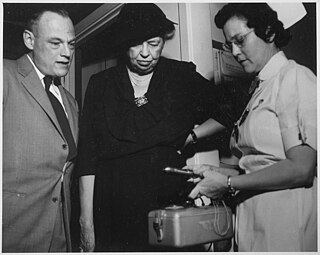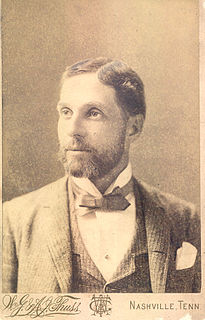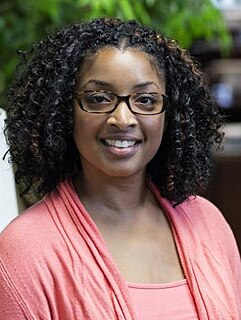Related Research Articles

Vanderbilt University is a private research university in Nashville, Tennessee. Founded in 1873, it was named in honor of shipping and rail magnate Cornelius Vanderbilt, who provided the school its initial $1-million endowment; Vanderbilt hoped that his gift and the greater work of the university would help to heal the sectional wounds inflicted by the Civil War.

James Morris Lawson Jr. is an American activist and university professor. He was a leading theoretician and tactician of nonviolence within the Civil Rights Movement. During the 1960s, he served as a mentor to the Nashville Student Movement and the Student Nonviolent Coordinating Committee. He was expelled from Vanderbilt University for his civil rights activism in 1960, and later served as a pastor in Los Angeles for 25 years.

Peabody College of Education and Human Development is one of ten colleges and schools that comprise Vanderbilt University. Peabody College provides graduate, undergraduate, and professional education. Peabody's faculty are organized across five departments, and include researchers in education, psychology, public policy, human development, special education, educational leadership, and organizational development. Peabody has a long history as an independent institution before becoming part of Vanderbilt University in 1979. The college was ranked fourth among graduate schools of education in the United States in the 2021 rankings by U.S. News & World Report. It was ranked as the top graduate school of education in the nation during the 2009, 2010, 2011, 2012, and 2013 editions of those rankings.

Landon Cabell Garland (1810–1895), an American, was professor of physics and history and university president three times at different Southern Universities while living in the Southern United States for his entire life. He served as the second president of Randolph–Macon College in Ashland, Virginia, from 1836 to 1846; then professor from 1847 to 1855, and then third president of the University of Alabama in Tuscaloosa, Alabama, from 1855 to 1867; and first chancellor of Vanderbilt University in Nashville, Tennessee, from 1875 to 1893. He was an apologist for slavery in the United States before the Civil War, but afterward became a vociferous spokesperson against slavery when it became possible to do so.
The University of Nashville was an educational institution that existed as a distinct entity from 1826 until 1909. During its history, it operated at various times a medical school, a four-year military college, a literary arts college, and a boys preparatory school. Educational institutions in operation today that can trace their roots to the University of Nashville include Montgomery Bell Academy, an all-male preparatory school; the Vanderbilt University Medical School; Peabody College at Vanderbilt University; and the University School of Nashville, a co-educational preparatory school.

Kenneth Lee Carder is a retired American Bishop of the United Methodist Church, elected in 1992. Carder distinguished himself as a Pastor, a member of Annual Conference and General U.M. agencies, a Bishop and an author.
Oak Ridge Associated Universities (ORAU) is a consortium of American universities headquartered in Oak Ridge, Tennessee, with an office in Washington, D.C., and staff at several other locations across the country.

Thomas Zacharia is an Indian-born American computer scientist. He received his bachelor's degree in mechanical engineering from National Institute of Technology, Karnataka in 1980 and a master's degree in Materials Science from the University of Mississippi in 1984. He obtained his doctoral degree from Clarkson University in 1987.
Karl Ziegler Morgan, was an American physicist who was one of the founders of the field of radiation health physics. Late in life, after a long career in the Manhattan Project and at Oak Ridge National Laboratory, he became a critic of nuclear power and nuclear weapons production.

William Grosvenor Pollard (1911–1989) was an American physicist and an Episcopal priest. He started his career as a professor of physics in 1936 at the University of Tennessee. In 1946 he championed the organization of the Oak Ridge Institute of Nuclear Studies (ORINS). He was its executive director until 1974. He was ordained as a priest in 1954. He authored and co-authored a significant amount of material in the areas of Christianity and Science and Religion found in books, book chapters, and journal articles. He was sometimes referred to as the "atomic deacon".
Justin Potter Wilson is an American lawyer and Republican politician who is Tennessee state Comptroller of the Treasury. He has been Tennessee deputy governor, a federal judicial nominee to the U.S. Court of Appeals for the Sixth Circuit, and an adjunct professor at Vanderbilt University Law School.
Kelly Miller Smith Sr. was a Baptist preacher, author, and prominent activist in the Civil Rights Movement, who was based in Nashville, Tennessee.

John Ragan is a Republican member of the Tennessee House of Representatives, for the 33rd District, encompassing parts of Anderson County, Tennessee.

Mack Alfred Breazeale was an American physicist particularly known for his work in ultrasonics and physical acoustics. Breazeale is widely regarded as one of the leading acousticians of the 20th century, highly accomplished in both theory and experiment. When he died, he was a retired Distinguished Research Professor and Senior Scientist at the National Center for Physical Acoustics at the University of Mississippi. Born in Leona Mines, Virginia, Breazeale grew up near Crossville, TN. Educated at Berea College, the Missouri School of Mines, and the Michigan State University, he was a tireless researcher and trained many others in the field of physics. Before his appointment at the National Center for Physical Acoustics, he was professor of physics at the University of Tennessee (1962-1995) and at Michigan State University (1957-1962). A longtime editor of the Journal of the Acoustical Society of America, he was a fellow of the Acoustical Society and received its Silver Medal in 1988. He was a fellow of the Institute of electrical and Electronics Engineers and Great Britain's Institute of Acoustics, and had been a Fulbright Research Fellow in Stuttgart, Germany early in his career.

William Lofland Dudley was an American chemistry professor at both the University of Cincinnati and Vanderbilt University and an athletics pioneer during the Progressive Era. At Vanderbilt, he was appointed dean of its medical department. He was also once vice-president of the American Association for the Advancement of Science, and was notably director of affairs on the Tennessee Centennial Exposition executive committee.

Yvonne Y. Clark was a pioneer for African-American and women engineers. She is the first woman to get a Bachelor of Science degree in mechanical engineering at Howard University. She is the first woman to earn a master's degree in Engineering Management from Vanderbilt University. She was the first woman to serve as a faculty member in the College of Engineering and Technology at Tennessee State University, then an emereti Professor.
Oscar Touster was an American molecular biologist. He was the founder and first chair of the molecular biology department of Vanderbilt University. He served as the president of the Oak Ridge Associated Universities from 1976 to 1988 and chaired the board of directors from 1988 until 1991.
Jessie Carney Smith is an American librarian and educator, and Dean of the Fisk University Library and Camille Cosby Distinguished Chair in the Humanities. She was the first African American to earn a Ph.D. degree in library science from the University of Illinois. She is also a scholar and author of research guides and reference books focusing on notable African-American people.
Thomas Daniel Young was an American academic. He was the first Gertrude C. Vanderbilt professor of English at Vanderbilt University, and the author or editor of a dozen books about the literature of the Southern United States.

Clarice Evone Phelps (née Salone) is an American nuclear chemist researching the processing of radioactive transuranic elements at the U.S. Department of Energy's Oak Ridge National Laboratory (ORNL). She was part of ORNL's team that collaborated with the Joint Institute for Nuclear Research to discover tennessine. The International Union of Pure and Applied Chemistry, recognizes her as the first African-American woman to be involved with the discovery of a chemical element. Phelps was formerly in the US Navy Nuclear Power Program. At ORNL, Phelps manages programs in the Department of Energy's Isotope & Fuel Cycle Technology Division investigating industrial uses of nickel-63 and selenium-75.
References
| | This article about an American physicist is a stub. You can help Wikipedia by expanding it. |